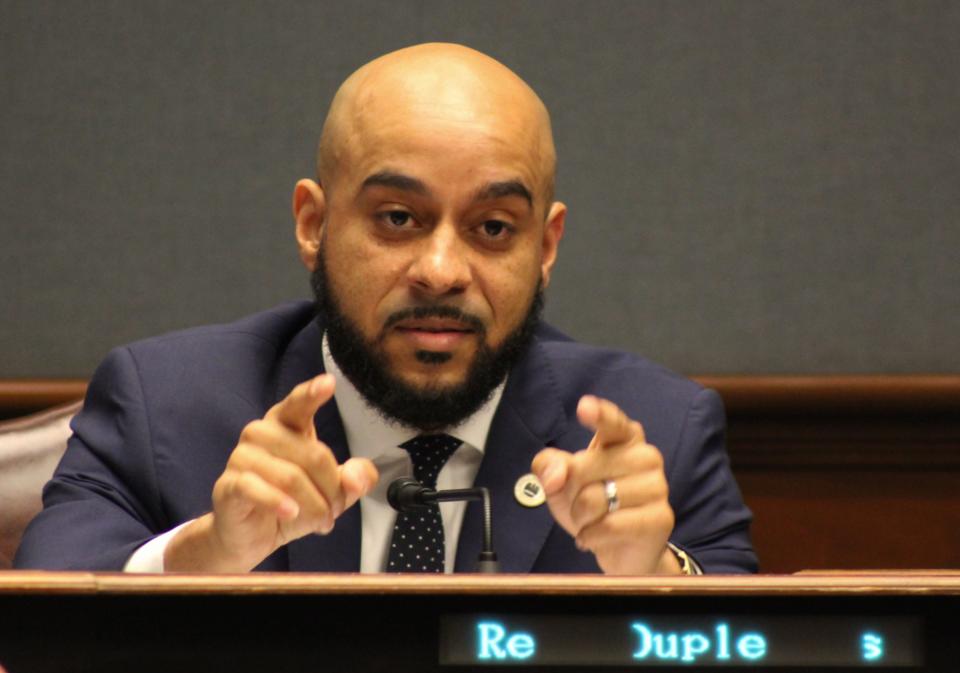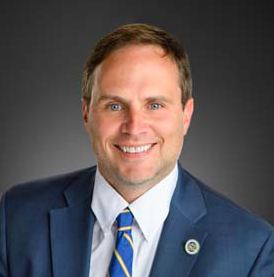Analysis | Reanimation of Greene tragedy, and timing, could have far-reaching consequences
BATON ROUGE — After a text surfaced suggesting that Gov. John Bel Edwards knew more than he had acknowledged about the death of a black man in Louisiana State Police custody, what was going to be a tense redistricting session became more contentious.
Battle lines were already drawn between Republicans and Democrats over the balance of power in state legislative and congressional seats, and the controversy involving the governor added a new dimension to the fight
It also suddenly reversed the roles that Black lawmakers and Republican leaders had played after the death of Ronald Greene in a high-speed car chase in 2019, as if Louisiana politics had fallen through the looking glass.

When videotapes were released last May showing that troopers had beaten Greene severely, raising questions about whether he died from their brutality rather than injuries in a car crash, Republicans were largely silent about what had happened to the 49-year-old Monroe man, and Democrats pushed vehemently for justice and accountability.
More: Gov. John Bel Edwards denies any connection with coverup of Ronald Greene's death
Now Republicans are out for the governor’s blood, claiming he misled the public about what he knew, and members of the Louisiana Legislative Black Caucus, the largest group of Democrats in the Legislature, are parsing their words carefully, fearful of harming a long-time ally.
Black lawmakers and civil-rights groups know that the threat of an Edwards veto is one of the few levers they have to influence the redistricting process — and that anything that weakens Edwards right now benefits Republican efforts to shape the district maps to their advantage.
Rep. Tanner Magee, R-Houma, the second-ranking leader in the House, does not fault Black Caucus members for giving Edwards the benefit of the doubt. He said they need to keep their alliance with him to get any of their agenda through.
“I think that they see for the greater overall picture on these issues that Governor Edwards is probably the best person to facilitate that for them,” Magee said.

Rep. Royce Duplessis, D-New Orleans, said the Republicans’ actions “speak for themselves.”
“I think we see why they are hammering down,” Duplessis said. “It's because you have a Democratic governor.”
Related: Louisiana State Police detectives met with Gov. Edwards' top attorney about Ronald Greene case
Whatever the motivations on either side, the reanimation of the Greene tragedy, and the timing, could have far-reaching political consequences.
What's at stake for Edwards, Louisiana?
Even though Black residents make up roughly one-third of the state’s population, only one of Louisiana’s six congressmen is Black, and Black leaders need Edwards’ support if they hope to add a second majority Black congressional district. Black legislators also want to see the state Senate maps redrawn in a way that would make it easier to elect 13 Black senators instead of the current 11.
Republicans on Senate and House committees voted along party lines Friday to advance maps that would leave those racial breakdowns as they are. If those bills pass in both chambers and the criticism of Edwards’ response to the Greene case weakens him politically, it might strengthen Republicans chances to override any veto.
More: Will Louisiana's Senate seats reflect its minority population? Why redistricting matters
Louisiana is in a unique situation, having a Republican-controlled Legislature but a Democratic governor. While Edwards has not said what maps he would or would not veto, he has said that he thinks it would be fair if two of the state’s six congressional districts were majority Black.
Just last year, Edwards was able to narrowly avoid a veto override on another sensitive social topic, a bill that banned transgender children from competing in sports. The Senate voted to override, but the House fell just two votes short. An effort to override his veto of a bill to allow for concealed carry of firearms without training narrowly failed in the Senate.
What’s at stake in redistricting is the balance of political power for Louisiana for the next decade. Republicans have an interest in preserving the status quo and Democrats have an interest in carving out a few more positions.
Greene died in May 2019 after a struggle with State Police troopers following a high-speed chase outside Monroe. Police initially covered up the incident by telling his family that he died in a car wreck.
Edwards was largely silent on the matter and declined to characterize police actions until the Associated Press released bodycam videotapes in May 2021 showing the troopers had beaten, stunned and choked Greene. At that point, Edwards called their actions “deeply unprofessional and incredibly disturbing,” adding that their behavior was “criminal.”
Should the Legislature investigate?
The controversy was reignited when the AP released a report on Jan. 28 showing that Edwards had received a text from the State Police superintendent notifying him of the incident hours after the arrest. The text did not contain Greene’s name, and it said he had been driving over 110 mph as troopers pursued him.
But the text also noted that “a violent, lengthy struggle took place” and that the suspect “became unresponsive” before emergency medical personnel arrived.
House Speaker Clay Schexnayder, R-Gonzales, said that Edwards told him last summer that there was no need for a legislative inquiry into the incident because Greene “died in a wreck,” something the governor denies saying.
Senate President Page Cortez, R-Lafayette, who was at that meeting, said he does not remember the governor attributing Greene’s death to a wreck. He said he also came away with the sense that there was no need to investigate the incident.
Schexnayder said the Legislature should investigate what the governor knew. Edwards said any such investigation would be a “witch-hunt with no basis in fact.”
The Louisiana Republican Party also is calling for an investigation, citing Edwards “repeated moral failures.”
Richard Lipsey, a longtime Republican but a supporter of Edwards, fired back at the state party chair. “There is no scandal except in your imagination,” Lipsey said. “You are damaging your own party’s credibility.”
If Edwards is weakened by the controversy, the fight for two Black congressional districts and for additional Black House and Senate seats could be lost.

“There's gonna have ramifications for sure,” Magee said. “I just don't know exactly what they are yet.”
'How do we deal with this going forward?'
Rep. Jack McFarland, R-Winnfield, acknowledged that the controversy had the potential to be a distraction from the business of redistricting. “I don't want it to cloud our judgment, on our responsibility, in fairness to redistricting,” McFarland said.
While Democrats are saying little about Edwards, Duplessis said they are not giving up the fight over what the State Police did to Greene.
“This issue with Ronald Greene is nothing new,” he said. “We've been screaming for justice for Ronald Greene.”
'I just won't fail him': In Ronald Greene's death, a mother's defiant quest for truth
“Right now, we're going to continue to focus on justice for Ronald Greene and accountability,” he said. “And also focused on redistricting.”
Davante Lewis, a racial-justice advocate, is worried that both parties will try to use the Greene case for political advantage.
“I don't want the governor to say he would veto a map that doesn't represent Black people adequately, simply because he's trying to buy favor from Ronald Greene,” Lewis said. “I don't want the Republicans to use Ronald Greene's death and the murder and the coverup or whatever has happened at State Police as an avenue to say they they're the ones about Black people.”
Peter Robins-Brown, the executive director for Louisiana Progress, an advocacy group, said any issue that receives this kind of national attention forces politicians to make political calculations.
“For example, how does this look for us? How do we deal with this going forward? And how do we, frankly, use this to kind of further the larger goals we may have?” Robins-Brown said.
There also is a chance that the controversy could cause Edwards to draw a harder line on what maps he might veto to help shore up his Black support.
“The governor and the Black Caucus kind of need each other to get the things done that they want to get done,” Robins-Brown said. “I would think that it's more likely that this helps strengthen the alliance.”
Robins-Brown also said that any politicization of the tragedy is bad for everyone. “We start thinking about the political implications of it and we often lose track of the humanity involved,” he said.
This article originally appeared on Lafayette Daily Advertiser: Ronald Greene tragedy, Edwards connections could have consequences

